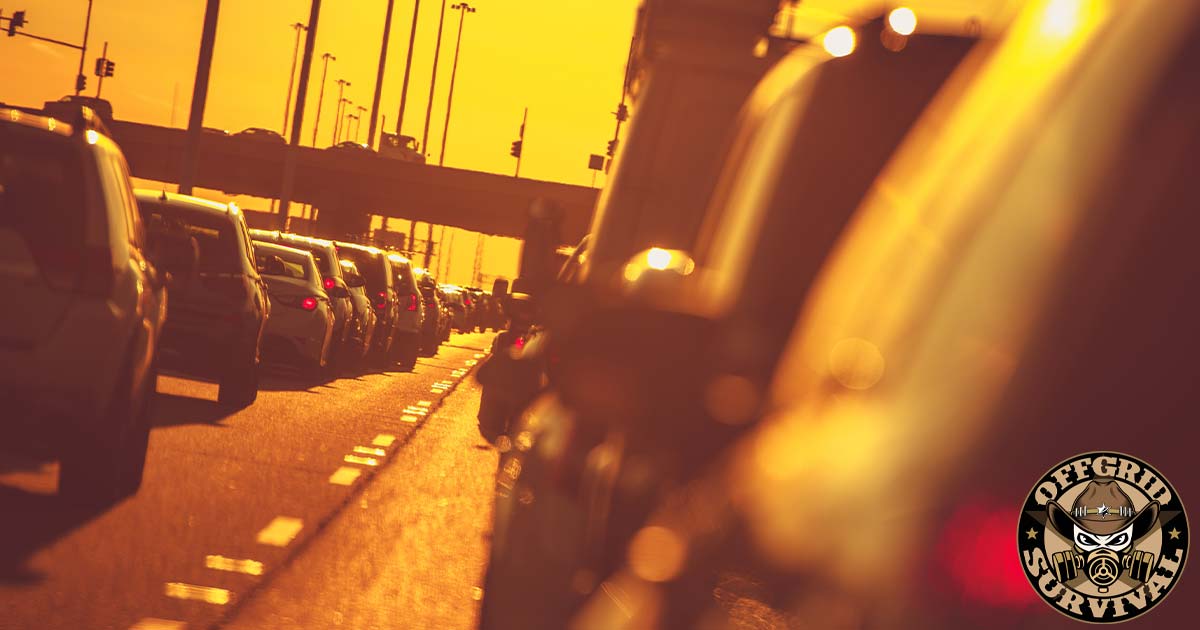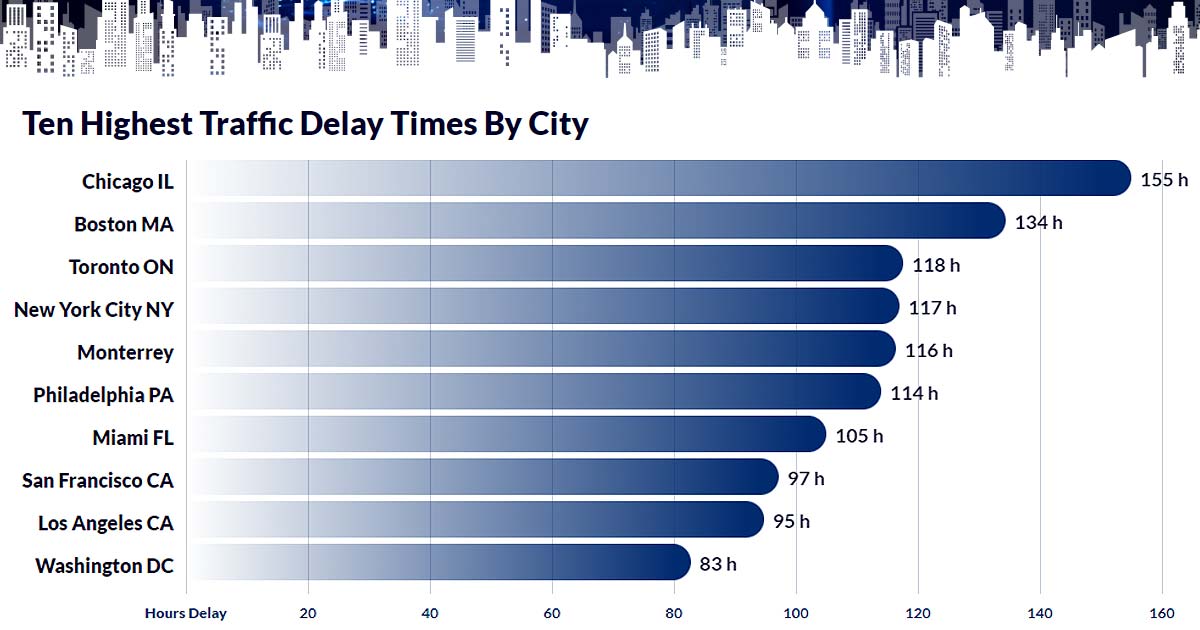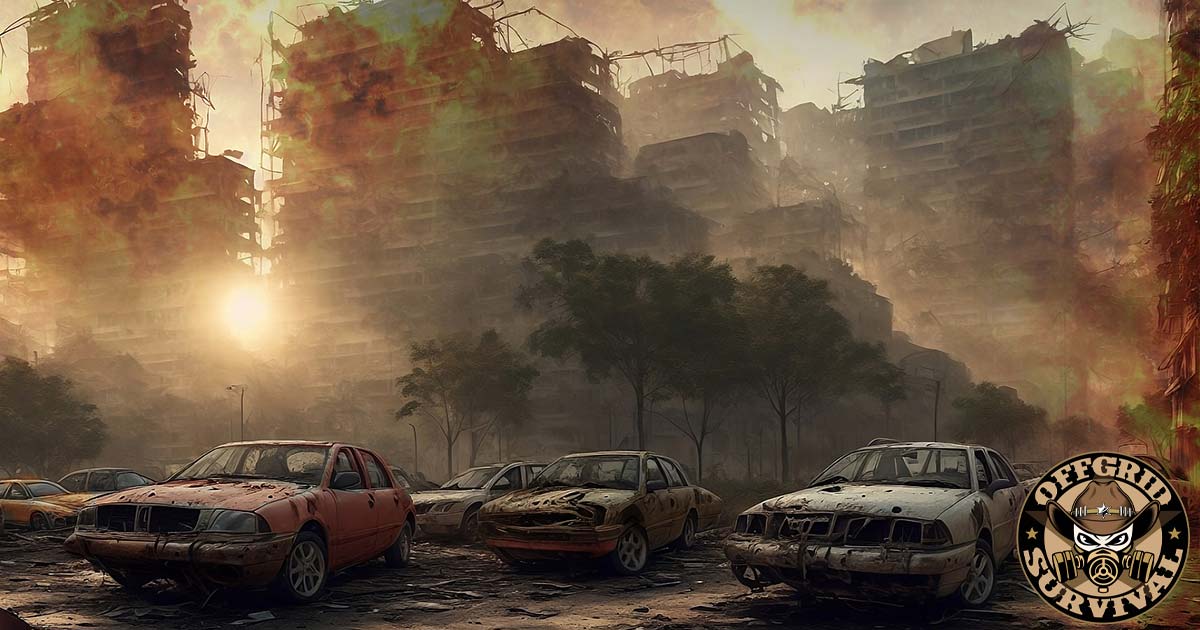
Are you planning on riding out a disaster in the big city? You may want to rethink that plan. Picture this: a disaster strikes, chaos and social unrest take over the city, and you find yourself trapped in one of the country’s most populated areas with no real way out. Welcome to the deathtraps of urban America, where residents will be at the mercy of hundreds of threats should disaster strike.
Cities like San Francisco, Las Vegas, New York, Chicago, and numerous other sprawling urban centers may be great places during the good times, but beneath the surface lies a serious threat in how they are constructed – there are frighteningly few escape routes during emergencies.
When disaster strikes, the critical arteries that could lead you to safety will most likely be rendered useless, destroyed, or jam-packed with millions of frantic evacuees trying to flee the city trapped like rats in a maze. The harsh reality is that staying within the city’s during times of crisis could easily become a death sentence for the unprepared.
If you live in one of these major cities, the odds of being able to make in out during a mandatory excavation or large-scale disaster are pretty small.

The United States is home to some of the world’s most clogged and congested cities, with five out of the top 10 global cities with the heaviest traffic within its borders. Among these, Chicago stands as a prime example of the potential nightmare people in big cities will face during a real disaster. In 2022, the average driver in Chicago lost a shocking 155 hours – almost six and a half days – stuck in a never-ending gridlock of vehicles.
Now, imagine the horror show these highways will become during a disaster situation When chaos strikes, and panic sets in, these already overloaded roads will become paralyzed with millions of desperate people trying to escape the chaos. The limited escape routes will quickly become bottlenecks, leading to complete standstills and trapping countless unprepared people within the city.
Should I stay or Should I go? Why would you want to leave your home?

This is often a question I receive from people who don’t understand preparedness and in some cases even from those who have a pretty good grasp on survival topics – there are those who absolutely refuse to leave their home during any circumstance.
If you live in a densely populated urban area, having a solid bugout plan is an absolute necessity for survival. During disasters or emergencies, the chaos and desperation surrounding the situation can escalate pretty damn fast, leaving you with little time to make critical decisions. There are several reasons why having a well-thought-out evacuation strategy is vital for those living in the city.
Limited Escape Routes: As you hopefully picked up during the first part of the article, the number of viable escape routes in heavily populated cities is extremely limited. Highways, roads, and bridges can quickly become so congested that it could become impossible to leave the city. If disaster hits, you need to have alternate routes and contingency plans in place to avoid getting trapped in the chaos. That being said, most cities have very few major routes out, so you need to make sure you time things correctly!
Overwhelmed Resources: Emergency services and resources will be stretched thin during a crisis; big cities may become non-existent. First responders will struggle to reach everyone in need, and essential supplies like food, water, and medical aid will run out quickly if supply chains are cut off. By having an evacuation plan, you can avoid relying on other people, businesses, and the government and increase your chances of finding safety and resources on your own.
Social Unrest: There is no doubt in my mind that this is going to quicly become the nuber one threat to anyone living in a big city. In times of crisis, civil unrest can start quickly, leading to violence, looting, and widespread chaos. Staying in a densely populated area during a disaster will expose you to unnecessary risks and criminal behavior.
Infrastructure Problems: Urban areas are highly dependent on aging and unreliable infrastructure systems, such as antiquated power grids, water supply networks, and communication lines. In a disaster, these critical systems may fail, leaving you without the serveices you need to survive in this environment.
Contamination and Disease: In crowded cities, disease transmission and contamination risk increases significantly. Deadly chemical spills, industrial accidents, pandemics, and other health hazards can pose severe threats to urban residents.
Acts of Terrorism: Urban centers are often high-profile targets for terrorist attacks, including biological or nuclear threats.
Escaping Urban Prison Camps: Knowing when it’s time to leave

In order to safely bug out, you need to be aware of what’s going on around you, especially if you live in one of the large urban centers. Your best bet for survival during an evacuation causing disaster is not getting caught in the chaos – that means being able to make your escape BEFORE the shit hits the fan.
To do that, you need to have a plan in place that includes when you would leave, what types of disasters would cause you to leave, and of course a predetermined destination where you intend on heading during a crisis. Check out my article on building the ultimate bug out bag for more ideas on what you need to pack, and what considerations you need to prepare for when planning to evacuate.
If you wait for things to go bad, or you wait for an evacuation notice from your local government, you probably waited too long. Put your plans in place now, and don’t be caught off guard. The last thing you want to do is count on a government agency that has very little vested interest in your health and safety.
BUGOUT RESOURCES
- Bugout Guide: 60+ Preparedness Resources for Getting the Hell out of Dodge!
- OFFGRID Survival Budget Bug Out Bag Recommended Gear
- Bug Out Resource Center: Learn where to go, what to take, how to survive during crisis situations, and why bug out bags are a crucial part of your plan.
- Staying Away From High Density Population Centers



what are a few good radio staions or trusted websites to look for heads up on potential disasters? ive read stories online and watched the news but all seem to play different cards and give you a run around. I’ve seen and heard of things from friends that are possibly taking place as we speak,but how would i be more sure? i can’t afford to just drop spend and move. i do have a place planned to go but as this article states freeways can be clogged or shut down. anything can help, thanks
find and memorize routes off of highways to your destination. country roads make take longer to get where you’re going, but it will be less congested. fewer people will know about them. try to google a route off of highways. find paper maps that are up to date. the internet might be down when TSHTF. I don’t know about radio stations or websites. if you find out, let me know.
Walk the route with your vehicle ahead of time to get an ideas of travel time, etc. Regarding scanners, most police agencies are going with frequency hopping radios. Whata this means is you will have to purchase a hi priced scanner to receive. Low priced pocket scanners, can’t keep up with the frequency hopping and few if any radio traffic is received. An idea is a tone alert weather radio. The warnings are put out around an hr before the projected emergency. As for being reluctant to move, remember what happened in the riots of 68 in DC: the counties around the city sealed it off. Wait too long then survival will really get complicated. Just some ideas.
Try and get hold of a map of the storm sewers in your city. If all other routes are blocked, you may be able to escape that way.
If roadways are unusable, it would be possible to follow train tracks out of a city. Rail traffic will continue to move in most scenarios. In the event of the government shutting down the roadways, sneaking onto a ralcar may be the only way to escape the city. Remember, the sky may be full of eyes (drones, helicopters, etc.), so either get inside of or under a car/tarp/cover of some kind and ride out of the city that way. Getting on and off moving rail cars is extremely dangerous and can kill you, so don’t be stupid. Wait for the train to slow. It will when it approaches a rail yard or signal not in it’s favor…then get off.
Be careful to avoid choke points like bridges or tunnels. Try and find alternative forms of travel like boats or bike/horse trails.
Hello, You need to get out of this country before the whistle blows. The Jews found out the hard way by staying in Germany thinking things would get better. Have we forgotten the lessons learned from World War Two? History always repeats itself. Things are not getting better now they are getting worse. What are you waiting for…go now while you still can. Sell everything you own and move to a safe country. The USA has been targeted for termination, we are living on borrowed time. These are the End Times the Bible tells us about. WAKE UP AMERICA
This article has nothing to do with (urban prison camps). The second part of the title would suffice. That said, the article makes some sound suggestions. Having lived through several of these senarios, I witnessed the closing of the entrance/exit to a city. It was done to protect the citizens of that city from out of control, mostly youths, who were “rioting”. During a chemical spill buses were still allowed to go in and out to evacuate even though cars were prohibited so you might want to familiarize yourself and support local transit. San Francisco’s only natural disaster problem is earthquake, the last big one was in 1989. These major quakes reoccur every ninty to one hundred years. That gives the citizens of SF at least eighty years to prepare. If there is a pandemic, anyone on either coast, might consider a little fishing, their is no better place to be in a pandemic than in the ocean, having fun while the rest of humanity deals with it. What would you do? I don’t have a yacht YET!! Now if there’s a sunami, all bets are off.
Probably the “best’, most prepared couple I know not only have quality B.O.Bs, impressive gear, ample provisions and have ‘scenario mapped’ with several potential circumstances es and plans… among all this, they’ve added caches/ stashes to their mix. These are hidden personal waypoints which contain supplies are located along predetermined routes which thereby can become previous resources enabling more extensive bug-out.